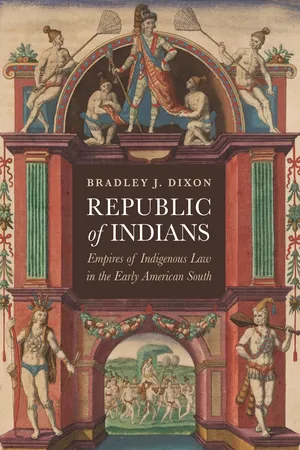
Republic of Indians
Empires of Indigenous Law in the Early American South
- 336 pages
- English
- ePUB (mobile friendly)
- Available on iOS & Android
About this book
A sweeping history of the Native Southerners who wrote their principles into Spanish and English law A sweeping history of the Native Southerners who challenged European empires from the inside, Republic of Indians tells the story of Indigenous leaders who wrote their principles into Spanish and English law.While in the Spanish Empire, Natives were a recognized part of "la república de indios, " the "republic of Indians, " other Natives across the early American South understood themselves to be joined with European colonists in larger polities, each jealously guarding their own bodies of liberties under royal sanction. Thus, rather than simply rejecting European pretensions to rule them as subjects and vassals, Native Southerners as diverse as the Apalachees, Pamunkeys, Powhatans, and Timucuas redefined their status to become political players in legislative assemblies and the courts of distant monarchs. They pushed for incorporation in larger political systems in which they had a say and were themselves instrumental in creating.Adapting pre-invasion practices to the technology of writing and the challenges of colonialism, Indigenous petitioners sought exemptions from labor and protection for "the lands that God gave to them, " as well as the right to install preferred leaders, avoid enslavement, ally with the Crown against colonists, ease harsh colonial laws, and even amend the terms of treaties and compacts. Bradley J. Dixon shows how their petitions also stand as enduring contributions to American political thought and how it was these "vassals" and "subjects" who gave meaning to the modern idea of tribal sovereignty. In the South, the Spanish and English empires came to resemble one another precisely because they were both dependent to a remarkable degree on maintaining Indigenous political consent and were founded in large part on Indigenous conceptions of law.
Tools to learn more effectively

Saving Books

Keyword Search

Annotating Text

Listen to it instead
Information
Table of contents
- Cover
- Series Page
- Title Page
- Copyright
- Dedication
- Contents
- Prologue. “A Residencia for the Dead”
- Chapter 1. Caciques and Kings, 1608–1632
- Chapter 2. “Poor Indians,” 1633–1673
- Chapter 3. “Emboldened Indians,” 1674–1678
- Chapter 4. “Neither Vassals nor Subjects,” 1670–1700
- Chapter 5. “As the Spaniards Always Have Done,”
- Epilogue. The Authors of Their Sovereignty
- List of Abbreviations
- Notes
- Index
- Acknowledgments
Frequently asked questions
- Essential is ideal for learners and professionals who enjoy exploring a wide range of subjects. Access the Essential Library with 800,000+ trusted titles and best-sellers across business, personal growth, and the humanities. Includes unlimited reading time and Standard Read Aloud voice.
- Complete: Perfect for advanced learners and researchers needing full, unrestricted access. Unlock 1.4M+ books across hundreds of subjects, including academic and specialized titles. The Complete Plan also includes advanced features like Premium Read Aloud and Research Assistant.
Please note we cannot support devices running on iOS 13 and Android 7 or earlier. Learn more about using the app